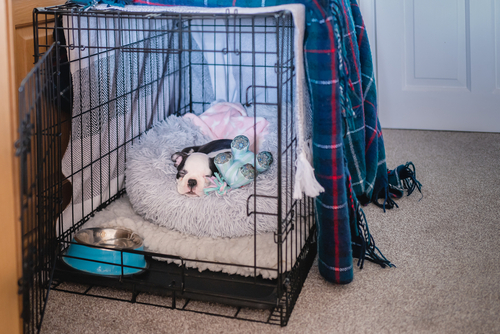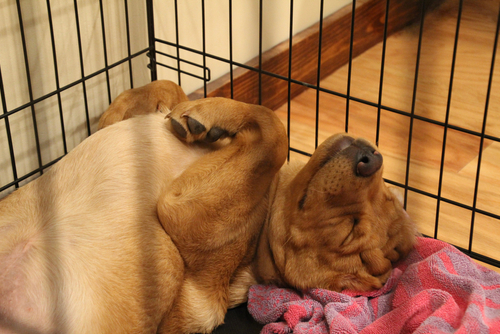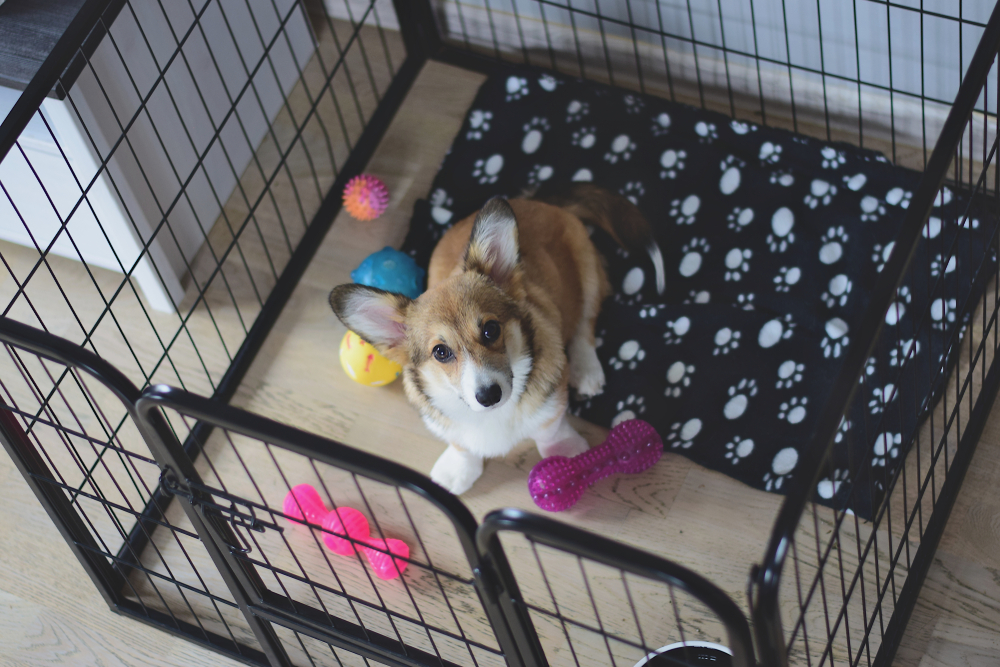As a puppy parent, you may be wondering whether or not you should crate train your furry friend. There are a lot of mixed opinions out there on the subject, but I’m here to tell you that crate training your puppy is actually a great idea!

Here are my top 4 reasons why crate training will make life with a puppy easier for you.
- House training/potty training-
One of the main reasons to crate train your puppy is that it will help with your potty training process. Puppies have small bladders and can’t hold their urine for very long. A crate will provide a space for your puppy when you can’t actively supervise her. An unsupervised puppy means there is a higher probability of your puppy soling in the house. It’s said that dogs have an instinctual desire to keep their sleeping area clean. By confining your puppy to her crate when you are unable to supervise her, you can avoid accidents from happening around the house. When she is let out of her crate, take her directly outside to her designated potty area so she can relieve herself.Side note: a puppy who really has to go potty and isn’t afforded ample potty opportunities may still go to the bathroom in their crate. We can’t expect our puppy to hold it for longer than they are able. When you gotta go, you gotta go! – be reasonable. - Keeps your puppy out of trouble.
Puppies are curious creatures, and they like to explore their surroundings. This can often lead to them getting into things they’re not supposed to, like chewing on electrical cords, destuffing a throw pillow, or gnawing on sneakers. If you can’t keep a close eye on your puppy at all times, crating them is a great way to make sure she stays safe and out of trouble (and will reduce your getting upset or frustrated with your puppy for chewing your things). Puppies are notorious chewers. It is their way of exploring their new world and soothing the teething all at the same time. Giving your puppy free reign of the house will likely result in chewing on things you would rather she not chew on, such as shoes, furniture, and area rugs. A crate will provide a puppy approved area which will help prevent destructive chewing habits from happening (and did I mention reduce your stress and frustration). - Crates are often a necessity.
At some point your puppy will need to go the vet to be spayed or neutered (lets hope this is the only time your puppy will ever need to be at the vet for an extended period of time). If you have a puppy who requires regular grooming, your puppy will likely need to be in a crate as she waits for her turn or for you to pick her up from the groomer. Your puppy will need to be on activity restriction while healing from her surgery or may need limited activity due to an injury to avoid making it worse. One day you may decide to travel with your puppy, and she may need to stay in a crate during a hotel stay or while visiting a friend or relative. If your puppy hasn’t been crate trained, all of these experiences will be extremely stressful for your puppy when she is suddenly confined. Being in unfamiliar places can be unnerving on its own. Add on the stress of being confined in a small, unfamiliar space- you have a recipe for a puppy who will likely become distressed and howl, bark, cry, and possibly harm themselves trying to escape the crate. - Provides a safe and secure place.
Having their own space can provide a safe (and familiar) spot for your puppy to retreat to if she is feeling stressed. Some dogs will seek out the bathroom, a closet, or go under a desk when there are fireworks or thunder. Having company over and entertaining doesn’t only add an element of stress to your life, but all the hustle and bustle and new people can cause your puppy to feel overwhelmed. The familiarity and safe space of their crate can give your puppy a place to retreat to.
 Crate training your puppy has many benefits and should be something to consider. I find the main reason people shy away from crate training is because they consider them cruel. If your puppy is whining, barking, and trying to get out of her crate, it would be cruel to leave her in there. Never place your puppy in a crate if she hasn’t been properly introduced to it. With positive reinforcement training, crates can become a happy place where your puppy can safely stay when she can’t be supervised.
Crate training your puppy has many benefits and should be something to consider. I find the main reason people shy away from crate training is because they consider them cruel. If your puppy is whining, barking, and trying to get out of her crate, it would be cruel to leave her in there. Never place your puppy in a crate if she hasn’t been properly introduced to it. With positive reinforcement training, crates can become a happy place where your puppy can safely stay when she can’t be supervised.
I want to make sure my puppy enjoys her crate and isn’t just tolerating it. Book your Discovery Session to learn how we can help you with your puppy training goals. Secure my Discovery Session.












